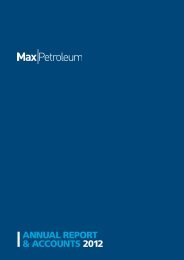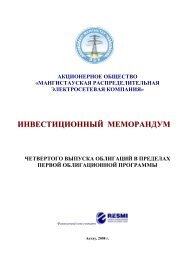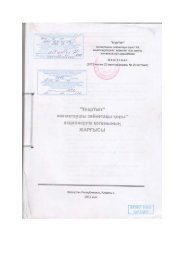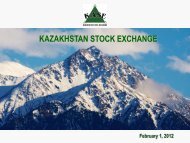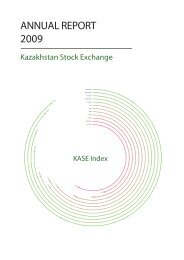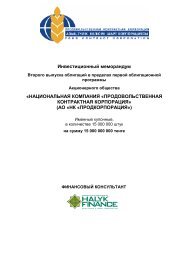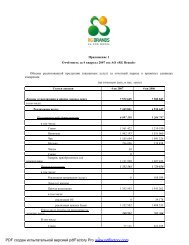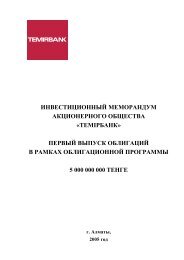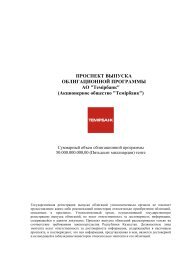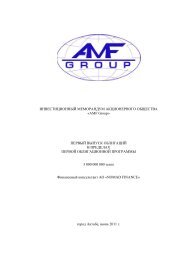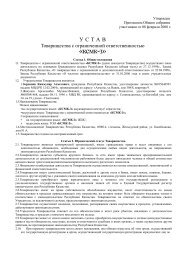JPMorgan - KASE
JPMorgan - KASE
JPMorgan - KASE
Create successful ePaper yourself
Turn your PDF publications into a flip-book with our unique Google optimized e-Paper software.
subsoil user and the Kazakhstani government. We did not incur excess profits tax in 2001 and do<br />
not expect to incur this tax in 2002, however, we may be subject to excess profit tax in<br />
subsequent years with respect to certain of our fields. See “Business and Properties — Upstream<br />
Operations — Excess Profits Tax”.<br />
We have been engaged in two court cases in Kazakhstan pertaining to disputed tax assessments<br />
for the years of 1998 and 1999. The first involved HOP and was for approximately $8.8 million.<br />
HOP has successfully argued its case at the first level of the court system in Kazakhstan and at the<br />
Supreme Court level. There is a possibility that the Ministry of State Revenue may appeal to the<br />
Supervisory Panel of the Supreme Court. No provision has been made in our financial statements<br />
for this assessment.<br />
The second case involved HKM and was for a total of approximately $10.5 million including taxes,<br />
fines, interest and penalties. HKM was successful at the first level of the court system and was<br />
unsuccessful on the majority of the issues at the Supreme Court level. HKM will appeal to the<br />
Supervisory Panel of the Supreme Court. We have provided for $2.9 million of the $10.5 million<br />
in our September 30, 2002 financial statements. We continue to dispute this assessment, as we<br />
believe the tax stability provisions of our hydrocarbon contract established that HKM is not<br />
subject to the assessed taxes.<br />
We have made further provision in our financial statements for an additional $5.5 million<br />
relating to tax assessments for 1998 and 1999, for the years 2000 and 2001 and for the first nine<br />
months of 2002.<br />
Through our operating subsidiaries in Kazakhstan, we have received tax assessments for 2000 and<br />
2001 amounting to $56 million, which have been reduced through negotiations to $44 million.<br />
We have not provided for these tax assessments in our financial statements and have filed or will<br />
shortly file court cases disputing these assessments.<br />
Kazakhstan’s tax laws are not clearly determinable and have not always been applied in a<br />
consistent manner. In addition, the tax laws are continually changing and evolving. The<br />
uncertainty of application and the evolution of tax laws creates a risk of excessive payment of tax<br />
by us, which could have a material adverse effect on our financial condition and results of<br />
operations.<br />
Risk Factors Relating to Our Industry<br />
Our drilling and production activities are subject to operational risks and hazards.<br />
Our drilling and production operations are subject to all the risks and hazards typically associated<br />
with the drilling and production of oil. The risks and hazards include fire, explosion, blowouts,<br />
cratering and oil spills, each of which could result in substantial damage to oil and natural gas<br />
wells, producing facilities, other property and the environment or in personal injury. We are not<br />
fully insured against all of those risks, nor are all of those risks insurable. Although liability<br />
insurance is maintained in amounts which are considered adequate, the nature of those risks is<br />
such that liabilities could exceed policy limits, in which event significant costs could be incurred<br />
which could have a material adverse effect upon our financial condition. Our production<br />
operations are also subject to all the risks typically associated with those operations, including<br />
premature decline of reservoirs and the invasion of water into producing formations.<br />
Volatility of oil prices could adversely affect our results of operations.<br />
Our financial condition, operating results and future growth are dependent on the prevailing<br />
prices for our oil production. Historically, the markets for oil have been volatile and those<br />
markets are likely to continue to be volatile in the future. Prices for oil are subject to large<br />
fluctuations in response to a variety of factors beyond our control, including:<br />
Š relatively minor changes in the supply of and demand for oil;<br />
23



